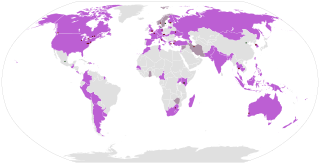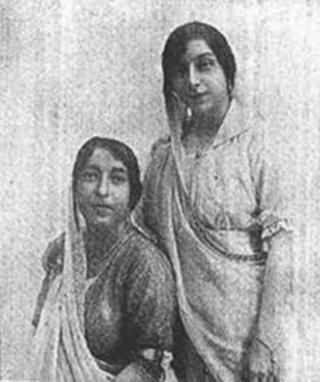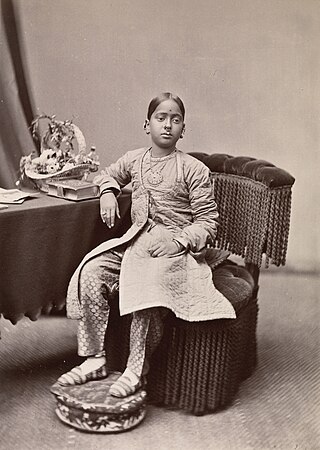
Bal Gangadhar Tilak, endeared as Lokmanya, was an Indian nationalist, teacher, and an independence activist. He was one third of the Lal Bal Pal triumvirate. The British colonial authorities called him "The father of the Indian unrest". He was also conferred with the title of "Lokmanya", which means "accepted by the people as their leader". Mahatma Gandhi called him "The Maker of Modern India".

The Imperial Order of the Crown of India is an order in the British honours system. The Order was established by Queen Victoria when she became Empress of India in 1878. The Order was open only to women, and no appointments have been made since the Partition of India in 1947. The Order was limited to British princesses, wives or female relatives of Indian princes and the wife or female relatives of any person who held the office of:

Jyotirao Govindrao Phule was an Indian social activist, businessman, anti-caste social reformer and writer from Maharashtra. His work extended to many fields, including eradication of untouchability and the caste system and for his efforts in educating women and oppressed caste people. He and his wife, Savitribai Phule, were pioneers of women's education in India. Phule started his first school for girls in 1848 in Pune at Tatyasaheb Bhide's residence or Bhidewada. He, along with his followers, formed the Satyashodhak Samaj to attain equal rights for people from lower castes. People from all religions and castes could become a part of this association which worked for the upliftment of the oppressed classes. Phule is regarded as an important figure in the social reform movement in Maharashtra.The honorific Mahātmā, was first applied to him in 1888 at a special program honoring him in Mumbai.

Bhikaiji Rustom Cama or simply as, Madam Cama, was one of the prominent figures in the Indian independence movement.

The International Council of Women (ICW) is a women's organization working across national boundaries for the common cause of advocating human rights for women. In March and April 1888, women leaders came together in Washington D.C., with 80 speakers and 49 delegates representing 53 women's organizations from 9 countries: Canada, the United States, Ireland, India, United Kingdom, Finland, Denmark, France and Norway. Women from professional organizations, trade unions, arts groups and benevolent societies participate. National councils are affiliated to the ICW and thus make themselves heard at the international level. The ICW enjoys consultative status with the United Nations and its Permanent Representatives to ECOSOC, ILO, FAO, WHO, UNDP, UNEP, UNESCO, UNICEF, UNCTAD, and UNIDO.

Gammiḍidala Durgabāi Deshmukh, Lady Deshmukh was an Indian freedom fighter, lawyer, social worker and politician. She was a member of the Constituent Assembly of India and of the Planning Commission of India.

Cornelia Sorabji was an Indian lawyer, social reformer and writer. She was the first female graduate from Bombay University, and the first woman to study law at Oxford University. Returning to India after her studies at Oxford, Sorabji became involved in social and advisory work on behalf of the purdahnashins, women who were forbidden to communicate with the outside male world, but she was unable to defend them in court since, as a woman, she did not hold professional standing in the Indian legal system. Hoping to remedy this, Sorabji presented herself for the LLB examination of Bombay University in 1897 and the pleader's examination of Allahabad High Court in 1899. She became the first female advocate in India but would not be recognised as a barrister until the law which barred women from practising was changed in 1923.
The All India Women's Conference (AIWC) is a non-governmental organisation (NGO) based in Delhi. It was founded in 1927 by Margaret Cousins in order to improve educational efforts for women and children and has expanded its scope to also tackle other women's rights issues. The organisation is the oldest nation-wide women's rights organization in India and has branches throughout the country. It is a member of the International Alliance of Women.

Maharani Chimnabai II was a queen and the second wife Maharaja Sayajirao Gaekwad of the princely state of Baroda, Gujarat, British India. She is the author of the treatise The position of Women in Indian Life (1911), and was the first president of the All India Women's Conference (AIWC) in 1927-1928, as well as the president of the National Council of Women in India in 1928-1937.
The Countess of Dufferin Fund was established by Hariot Hamilton-Temple-Blackwood, Marchioness of Dufferin and Ava, more commonly known as Lady Dufferin, in 1885 and was dedicated to improving women's healthcare in India. The Fund was founded after Queen Victoria gave Lady Dufferin the task of improving healthcare for women in India. The Fund provided scholarships for women to be educated in the medical field as doctors, hospital assistants, nurses, and midwives. It also financed the construction of female hospitals, dispensaries, and female only wards in preexisting hospitals. The Fund marks the beginning of Western medicine for women in India and global health as a diplomatic concern.

Mithan Jamshed Lam (1898–1981) was an Indian lawyer, social activist and the Sheriff of Mumbai. She was the first Indian woman barrister and the first Indian woman lawyer at the Bombay High Court. She was a member of the All India Women's Conference and served as its president in 1961–62. The Government of India awarded her the third highest civilian honour of the Padma Bhushan, in 1962, for her contributions to society.

Vidyagauri Nilkanth was an Indian social reformer, educationist, and writer. She was also one of the first two women graduates in Gujarat.

The All-Asian Women's Conference (AAWC) was a women's conference convened in Lahore in January 1931. It was the first pan-Asian women's conference of its kind. Dominated by Indian organizers, "the AAWC was a vehicle for Indian women to voice their ideas and vision of an Indian-centred Asia". Its predecessor, the All Indian Women's Conference (AIWC), aimed to examine areas of education and legislation to improve the position of women. Like the AIWC, the AAWC aimed to expand this agenda in order to include women in Asia's vision for independence.

Shareefa Hamid Ali, also known as Begum Hamid Ali, was an Indian feminist, nationalist, advocate, and political figure. She was the President of the All India Women's Conference in 1935, and one of the founding members of the United Nations Commission on the Status of Women in 1947 and debated a gender inclusive language in the Universal Declaration of Human Rights.

Sharda Mehta was an Indian social worker, proponent of women's education, and a Gujarati writer. Born to a family of social reformers, she was one of the first two women graduates in the modern-day Gujarat state of India. She established institutes for women's education and women's welfare. She wrote several essays and an autobiography as well as translated some works.
Sumant Mehta was a physician, independence activist and social worker from 20th-century India. Educated in London, he served as a personal physician of the Gaekwad rulers of Baroda State before entering public life in 1921. Along with his wife Sharda Mehta, he was involved in social and political activities.

Herabai Tata (1879–1941) was an Indian women's rights activist and suffragist. Married in 1895, Tata's husband was progressive and supported the education of his wife and daughter, hiring tutors to help her with her schooling. In 1909, Tata, who was Parsi, developed an interest in Theosophy and within a few years made the acquaintance of Annie Besant. Around the same time, in 1911, she met Sophia Duleep Singh, a British suffragist with Indian heritage, who influenced her development as a suffragist. A founding member and the general secretary of the Women's Indian Association, she became one of the women who petitioned for enfranchisement before the Montagu-Chelmsford investigation in 1917.
The Women's suffrage movement in India fought for Indian women's right to political enfranchisement in Colonial India under British rule. Beyond suffrage, the movement was fighting for women's right to stand for and hold office during the colonial era. In 1918, when Britain granted limited suffrage to women property holders, the law did not apply to British citizens in other parts of the Empire. Despite petitions presented by women and men to the British commissions sent to evaluate Indian voting regulations, women's demands were ignored in the Montagu–Chelmsford Reforms. In 1919, impassioned pleas and reports indicating support for women to have the vote were presented by suffragists to the India Office and before the Joint Select Committee of the House of Lords and Commons, who were meeting to finalize the electoral regulation reforms of the Southborough Franchise Committee. Though they were not granted voting rights, nor the right to stand in elections, the Government of India Act 1919 allowed Provincial Councils to determine if women could vote, provided they met stringent property, income, or educational levels.

Kitty Shiva Rao, was a Montessori teacher and theosophist from Austria who, by India's independence, had led a committee of women to draft an Indian Women's Charter of Rights and Duties for the new constitution of India. She studied child education and served on several women's movement and education boards including the All India Women's Conference (AIWC), All India Handicrafts Board, Indian Council for Child Welfare and Delhi University Board.

Maharani Chimnabai I was a queen and the first wife of Maharaja Sayajirao Gaekwad III of the princely state of Baroda, British India. Several memorials were built by Sayajirao following her early death.















